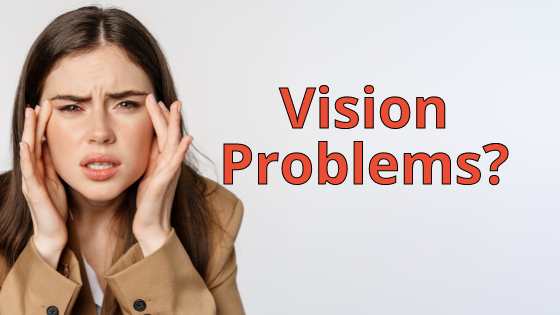Vision Problems & The Solution I Found
I never needed glasses until I hit 40. I was 40 years old and 3 months and I looked down at my computer at work and I could not read it.
That is how my vision journey began, and this is what I found as the solution.
I started using readers because I refused to get glasses. I had not needed them my entire life, so I did not want to start wearing them. So, for months I would put on readers to work at my job.
Then I needed them more and more. Finally, once Covid hit I was working from home and I could not get to the eye doctor. They were not seeing patients. I had to do something, so with my readers on I searched the web for a solution.
This is what I found and what worked for me.
Want to learn more about your eyes as you age? Read this.
Vision Problems as You Age
As you get older, your eyesight may start to change. It’s not uncommon for people over the age of 40 to experience some form of vision loss. In fact, by the time you reach 65 years of age, there is a high probability that you will experience some form of vision problems.
Why Does Your Vision Change as You Age?
There are several reasons why your vision changes as you age. One of the main reasons is due to changes in your eye’s lens. As you get older, your lens becomes less flexible and less able to change shape to focus on objects at different distances. This condition is known as presbyopia, and it can make it more difficult to read small print or see objects up close.
Another common condition that affects older adults is cataracts. Cataracts occur when the lens of your eye becomes cloudy, leading to blurry vision. Cataracts can develop slowly over time, and they are often a result of aging.
Macular degeneration is another condition that can affect your vision as you age. This condition occurs when the macula, the part of the eye responsible for central vision, deteriorates. Macular degeneration can cause blurry or distorted vision, and it can make it difficult to read or drive.
Common Vision Problems
As you age, you may experience a variety of vision problems. Some of the most common vision problems that older adults experience include:
- Presbyopia: As mentioned earlier, this condition makes it difficult to focus on objects up close.
- Cataracts: This condition causes the lens of your eye to become cloudy, leading to blurry vision.
- Glaucoma: Glaucoma occurs when there is a buildup of pressure in the eye, leading to damage to the optic nerve. This condition can cause loss of peripheral vision and, in severe cases, blindness.
- Macular degeneration: This condition causes the macula to deteriorate, leading to blurry or distorted vision.
- Dry eye: As you age, your eyes may produce less tear fluid, leading to dry eyes. This can cause discomfort and vision problems.
Preventing and Managing Vision Problems
While vision problems are common as you age, there are steps you can take to prevent or manage them. Here are a few tips to help you maintain good eye health:
- Get regular eye exams: Regular eye exams can help detect vision problems early, making them easier to treat. It’s recommended that adults get their eyes checked at least once every two years, and more frequently if they have a history of eye problems.
- Protect your eyes from the sun: Exposure to ultraviolet (UV) radiation can damage your eyes, leading to vision problems. Make sure to wear sunglasses or a hat when you’re outside, especially during peak UV hours.
- Eat a healthy diet: Eating a diet rich in fruits and vegetables can help protect your eyes. Foods like leafy greens, carrots, and sweet potatoes contain nutrients that are essential for eye health.
- Quit smoking: Smoking can increase your risk of developing cataracts, macular degeneration, and other eye problems.
- Manage chronic conditions: Conditions like diabetes and high blood pressure can increase your risk of developing vision problems. Make sure to manage these conditions through diet, exercise, and medication.
In conclusion, vision problems are common as you age, but there are steps you can take to prevent or manage them. Regular eye exams, protecting your eyes from the sun, eating a healthy diet, quitting smoking, and managing chronic conditions can all help maintain good eye health. If you’re experiencing vision problems, make sure to talk to your eye doctor to get the help you need.
You can also use the same solution I found.

